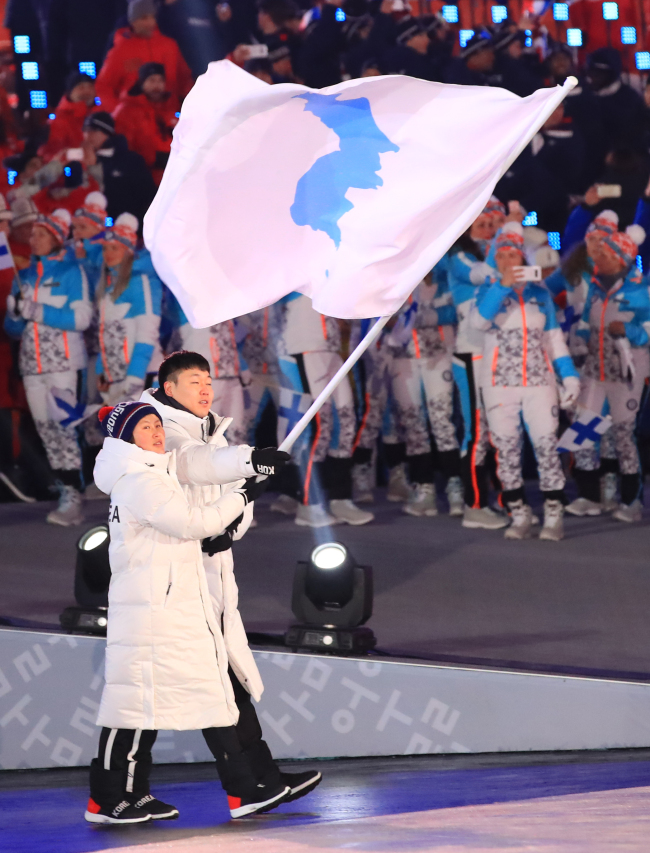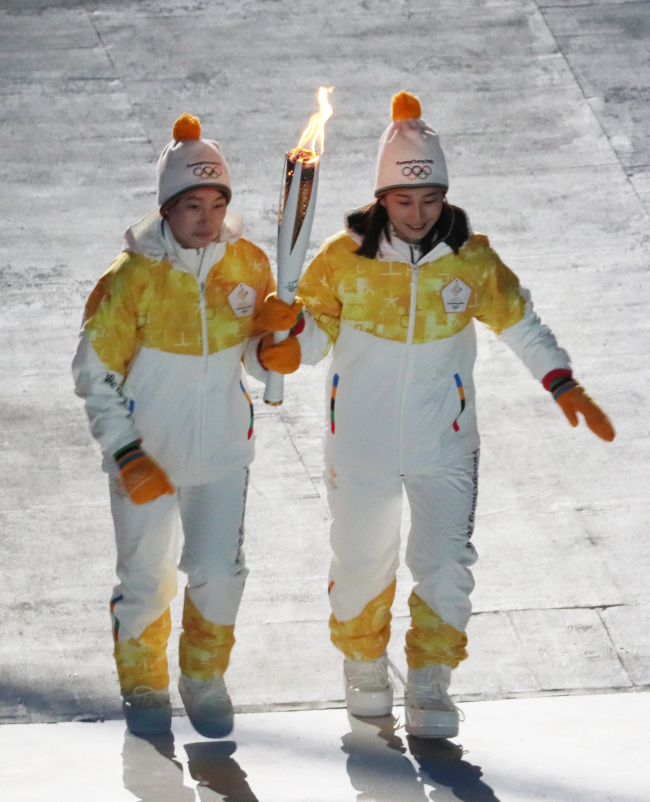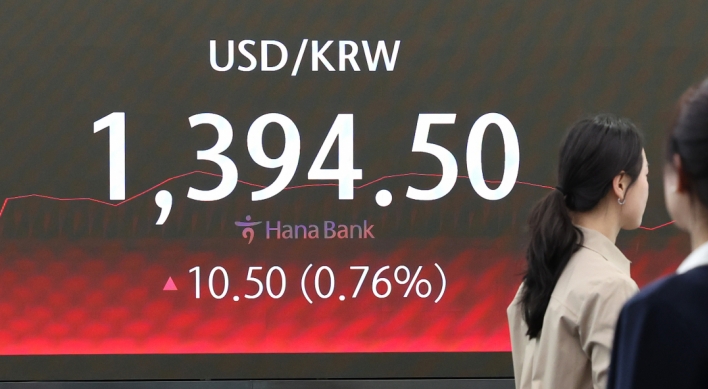[PyeongChang 2018] PyeongChang leaves landmark peace legacy through Koreas' rapprochement
By YonhapPublished : Feb. 25, 2018 - 09:42
As athletes end their hard-fought battles for medals at the PyeongChang Winter Olympics, the first Winter Games in South Korea will leave behind one of the most dramatic and symbolic peace legacies of any modern Olympics, thanks to the reconciliation of the two Koreas in sports -- a development that was unimaginable just a few months ago.
For the first time in an Olympic Games hosted by the South, some 200 delegates of the two Koreas marched together under a unified flag and in matching uniforms at the opening of the PyeongChang Games on Feb. 9, generating one of the most keenly observed and definitive hallmark events of the PyeongChang Games.
North Korea, which remains technically at war with the South, did not participate in the 1988 Seoul Summer Olympics.

South Korean male bobsledder, Won Yun-jong, and North Korean female hockey player, Hwang Chung-gum, lead the march by the joint Korean entourage, with the two Olympic athletes together raising the Korean Unification Flag -- which bears the image of a sky-blue Korean Peninsula against a white background -- to the tune of a rearranged version of iconic Korean ballad, "Arirang."
South Korean President Moon Jae-in and other world leaders gave standing ovations during the joint march. North's ceremonial head of state Kim Yong-nam and Kim Yo-jung, North Korean leader Kim Jong-un's sister, even traveled to the South to attend the opening ceremony.
Also during the opening ceremony, South Korean women's hockey forward Park Jong-ah and North Korean player Jong Su-hyon carried the Olympic flame together, running up the steps while holding the torch before handing it over to the cauldron lighter, former figure skating star Kim Yu-na.
It was the fourth joint-Korean march at the Olympics, and the first since Torino 2006. The two Koreas held 10 joint marches at opening events for international sporting events.
The joint march resulted from monthlong negotiations between the two countries and the International Olympic Committee (IOC) over the North's last-minute decision to participate in the games.
North Korea's participation in the PyeongChang Games -- let alone a joint march with South Korea -- seemed in doubt last year, with a series of military provocations, including a nuclear test, which drove up tension in the region.

But North Korean leader Kim Jong-un changed all that by offering to send an athletic delegation to PyeongChang during his New Year's message. South Korea welcomed the overture and the two sides reached their historic agreement just 17 days into 2018.
IOC President Thomas Bach extended an invitation to North Korea, a regime that has come under significant international sanctions for continued nuclear weapons development, because the IOC treats all national Olympic committees equally.
"North Korea, like any national Olympic committee, has the right and even obligation to take part in the Olympic Games," he said. "It is the mission of the Olympic Games and the IOC to treat everybody equally and to be politically neutral and to try to unite people."
The renewed Korean exchange in sports wasn't limited to just the joint march. It went much deeper, to the extent of diplomacy actually affecting the Olympic competitions, fielding a joint inter-Korean women's hockey team -- which was unheard of outside of non-friendly sporting events for the two Koreas.
The highly symbolic yet political decision, reached just weeks before the Olympics, became a major sticking point not just for Canadian head coach Sarah Murray and her team, but also for the public, which was sharply divided over the decision that required sacrifices by players of the South. The 23 South Koreans and 12 North Koreans were to serve as a symbol representing peace on the divided Korean Peninsula.
The team opened the Olympic tournament in a politically-charged atmosphere, with Moon in the stands alongside Yo-jong. The young team, with a handful of teenagers, was a nervous wreck and lost to Switzerland 8-0. The team lost all five games it played here by a combined score of 28-2.
But the symbolism of having athletes from the two Koreas on the ice together overrode all else. It even prompted one IOC member, Angela Ruggiero, to suggest the team should be nominated for the Nobel Peace Prize.
As for the players themselves, their minds and hearts had no room for peacemaking and diplomacy, as they were busy trying to score goals and win at the Olympics, regardless of their team having been hastily jumbled. At every opportunity, Murray insisted she only had a team of hockey players, not political crusaders.
Despite sending its largest delegation at a Winter Olympics, North Korea ended its ninth Winter Olympics appearance here in South Korea without a medal.
None of them qualified for the competition on merit, but the IOC granted them special exemptions after Pyongyang offered in January to participate in the Games.
The figure skating pairs team of Ryom Tae-ok and Kim Ju-sik had the strongest showing, finishing 13th with a personal best of 184.98 points. It was the highest-ranking position ever at an Olympics by a North Korean pair. North Korea has one silver and one bronze medal all-time in Winter Olympics.
With the closing of the PyeongChang Games, it will be virtually impossible to see the North Korean flag hoisted or the communist country's anthem being played publicly in the South.
But with the Moon administration, while maintaining pressure for the North's denuclearization, determined to keep the flame of inter-Korean detente and soft diplomacy burning, it would not be a surprise to see more exchanges in sports with the North in the near future, especially with Pyongyang having invited Bach and Korean Olympic officials to visit the North for talks at a mutually convenient time. (Yonhap)







![[KH Explains] How should Korea adjust its trade defenses against Chinese EVs?](http://res.heraldm.com/phpwas/restmb_idxmake.php?idx=644&simg=/content/image/2024/04/15/20240415050562_0.jpg&u=20240415144419)











![[Today’s K-pop] Stray Kids to return soon: report](http://res.heraldm.com/phpwas/restmb_idxmake.php?idx=642&simg=/content/image/2024/04/16/20240416050713_0.jpg&u=)